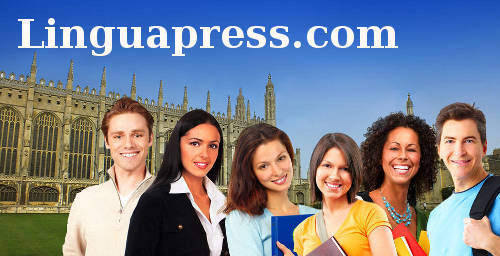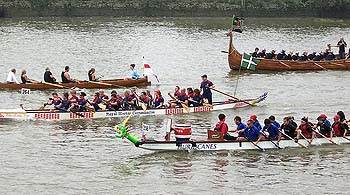|
|
| Linguapress.com | Advanced level reading resources | Intermediate reading resources | English grammar online | Language games and puzzles |
| Linguapress for mobiles - home page | English Grammar | Free advanced level resources | Free intermediate level resources |
 Intermediate
English
Intermediate
Englishon your mobile

A short intermediate level English resource on British life
London: THE GREAT RIVER RACE
Each year, one Saturday in September, crowds of people line the Thames through London, to watch one of the city's most unusual events; the "Great River Race".
 Many big cities have one
annual "marathon" race; London has two - one on dry land, the other on
water.
Many big cities have one
annual "marathon" race; London has two - one on dry land, the other on
water.
Technically, the Great River Race is not a marathon; it is slightly too short, and it is a boat race. Starting at Richmond, in the western suburbs of London, participants have to row their boats 22 miles, as far as the London docks, in the east.
The race is a relatively new event in the London calendar. The first race took place in 1988.
The idea was born in 1987, when members of the historic "Company of Watermen and Lightermen" (a very old professional organisation) rowed a replica 16th century royal barge from Hampton Court to the Tower of London.
In 1988,
they challenged other
"traditional boats"
to a race. Boats that want to take part must all be of traditional
design, with at least four oars
or paddles;
furthermore, each boat has
to carry at least one passenger.
Over the years, the race has become a
very colourful
event, with the participation of a wonderful variety of boats. While
most are ordinary rowing boats, there are also Viking longships, and
other unusual boats. In 1995, for instance,
the race was won by a
Chinese dragonboat, in a record time of 2 hours, 6 minutes and 31
seconds!
As the years go by, the number of participants keeps increasing; from 72 boats in 1988, the number of entries reached 295 in 1997, and will probably be even higher this year. Last year, there were teams from all over the U.K, and also from America, Canada, and five European countries.
In order to provide a thrilling finish to the race, a "handicap" system operates. At the start of the race, the slowest boats set off first, the fastest ones last.
In many ways, the Great River Race is a true race, in the traditional sense of the term - a race for amateurs, and a race without corporate sponsors.
event: occurrence, occasion - suburbs: the outside parts of a city - lighterman: boatmen - row: in the picture, men are rowing boats - replica ; reproduction, copy - oars and paddles: your row a boat with oars or paddles - - for instance : for example - set off: begin, depart.
Return to Linguapress site index
Printing: Optimized for printing with the Firefox or Chrome browsers
Copyright © Linguapress. Do not copy this document to any other website
Copying permitted for personal study, or by teachers for use with their students.
Student worksheet
The Great River Race
Reusing information - Interactive exercise.
Here is a postcard written by a young man called Joe. Last year, Joe took part in the “Great River Race”, and in this postcard he tells his friend about the experience. Complete the postcard, using information from the article, and putting all verbs in the right tense.Yesterday we took in the famous Great River Race. We from Richmond to a of 22 miles, which is than a Marathon. As our was than the others, we were able to set first.
We as fast we and managed to stay in position as far Tower Bridge. However, we finally overtaken a dragonboat, which eventually the race.
The Great River Race is a race, and there of people on both of the river. the boats were quite old, though others were just of old designs. If you in London next you should try to the race. It on a September.
This teaching resource is © copyright Linguapress 2000-2024.
Originally published in Freeway,
the intermediate
level
English
newsmagazine.
Republication on other websites or in print is not authorised
| Linguapress; accueil en Français | Découvrez l'Angleterre (en français) | Discover Britain |
Intermediate level EFL resource
 CEFR level B2
CEFR level B2Readability - Plain English. Flesch-Kincaid Grade level: 8.7
Reading ease level: 66.3
Intermediate
| A
selection of other resources in graded English from Linguapress |
| Selected pages |
| Intermediate resources : |
| Mystery - the Titanic and the Temple of Doom |
| Who is James bond ? |
| Sport: The story of football and rugby |
| Big red London buses |
| USA: Who was Buffalo Bill? |
| USA: Close encounters with a Twister |
| More: More intermediate reading texts |
| Advanced level reading : |
| Charles Babbage, the father of the computer |
| Who killed Martin Luther King? |
| USA - Discovering Route 66 |
| London's Notting Hill Carnival |
| More: More advanced reading texts |
| Selected grammar pages |
| Online English grammar |
| Noun groups in English |
| Word order in English |
| Reported questions in English |
| Miscellaneous |
| Language and style |
| Word stress in English |
| The short story of English |
This resource is © copyright Linguapress renewed 2024.
Copyright notice.
All articles published on this website remain the copyright © of Linguapress.com and/or their individual authors.
Reproduction is authorised exclusively for use by students for personal use, or for teachers for use in class.
Multi-copying of this resource is permitted for classroom use. In schools declaring the source of copied materials to a national copyright agency, Linguapress intermediate level resources should be attributed to "Freeway" as the source and "Linguapresss France" as the publisher.
Photo credits:
Creative commons photo by Cheric Baker, .
Linguapress.com -
Free EFL reading resources